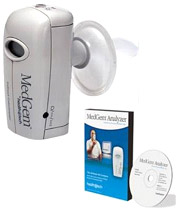Microlife MedGem Case Study: Westminster Medical Clinic
 The MedGem indirect calorimeter is a clinically-validated and FDA 510K-cleared, class II, medical device for measurement of patient resting metabolic rate (RMR).
The MedGem indirect calorimeter is a clinically-validated and FDA 510K-cleared, class II, medical device for measurement of patient resting metabolic rate (RMR).
Instead of estimating RMR with the Harris-Benedict or Katch-McArdle formula, the MedGem scientifically measures a clients Metabolic Fingerprint, that is unique to them.
Estimation formulas cannot factor in thyroid issues, the effects of medications, etc.
MedGem® Case Study: Westminster Medical Clinic
Westminster Medical Clinic (WMC) is a family medical office located in a Denver, CO suburb. WMC has approximately 7,000 patients, three family physicians, one physician assistant, one registered nurse (RN), and four medical assistants (MA).
WMC is a certified Level-3 Patient Centered Medical Home (PCMH) by the National Commission for Quality Assurance (NCQA). WMC treats obesity & metabolic syndrome as one of three disease states required by NCQA for PCMH. Dr. Hammond is a fellow of the American Academy of Family Physicians, national spokesperson on PCMH, and a clinical associate professor at the University of Colorado School of Medicine.
Why Integrate MedGem at Westminster Medical Clinic?
WMC offers chronic care clinics for patients diagnosed with Diabetes, Cardiovascular Disease, and Asthma/COPD. Dr. Scott Hammond is leading these clinics and the control rate for his diabetes patients is very good. Currently, 65% and 87% of his diabetes patients have blood pressure values below 130/80 mmHg and 140/90 mmHg respectively.
In addition, 63% of his diabetes patients have A1c levels below 7.0%. Although, his patients are doing well, most have not improved their bodyweight. Understanding that continued weight gain will complicate and further progress many of his patients chronic illnesses, Dr. Hammond sought to implement Microlife Medical Home Solutions, Inc. MedGem program to help his chronic disease patients with managing bodyweight.
RN and MAs’ training consisted of a 45-minute training on the MedGem device and software program and a two-hour workshop on group visit topics. The Physician and PA were briefly trained on the “key components” to the measurement and educational report. The billing department was informed of the CPT procedure code and ICD-9-cm codes that warrant medical necessity.
The medical provider determines the interest level and ambivalence of the patient to reduce bodyweight and if appropriate refers the patient to MedGem diagnostic procedure. The MA explains the procedure and provides a Metabolism Matters brochure outlining the pre-measurement requirements. The receptionist schedules the patient for the MedGem procedure.
On the day of the MedGem procedure the patient completes a patient-history questionnaire and rests in the patient lobby for 10-15 minutes. The MA obtains the patient’s physical measurements and conducts the MedGem diagnostic procedure. Following the 10 minute procedure, the MA enters the patient’s history and vital signs into the MedGem Analyzer software program. A detailed patient education report is printed and stored in the patients file for follow-up. The patient receives the report at the group visit or can schedule an individual follow-up appointment with their medical provider. The group visit is focused on individual energy-balance, calorie awareness, food portions, and physical activity. The patient returns within 4-6 weeks for a follow-up visit with the provider.
Patients indicated a better understanding of energy balance needed to achieve their personal weight management goal. In addition, initial patient outcomes indicate reductions in bodyweight (-1-lb/week), blood pressure (est. Sys: – 7 mm/hg & Dia: -4 mmHg), and waist circumference (est. -0.5 in.). The average charge for the RMR procedure day (CPT 94690 & C/M 99211) was $124.00 and over 95% of payers remunerated for this procedure. Moreover, all payers remunerated for the provider follow-up visit (E/M 99213-99214). WMC views the MedGem program as a clinically beneficial and cost-effective solution for their obese patients.
The MedGem program includes the MedGem hand-held indirect calorimeter that measures resting oxygen consumption to determine resting metabolic rate (RMR); MedGem Analyzer software program to develop an individual treatment program; and Microlife’s educational materials for patient education. In addition, Dr. Hammond wanted to include MedGem into his established group visit program.
Offer your clients the best possible results by incorporating the MedGem tools and solutions into your programs.
For more information, click on MedGem indirect calorimeter.
Contact me at 1-800-743-3328 to discuss MedGem RMR System Kit pricing options.
Harvey Harris